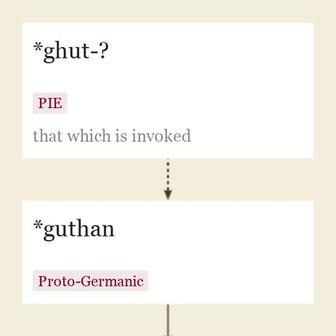gossip (n.)
Old English godsibb "sponsor, godparent," from God + sibb "relative" (see sibling). The sense was extended in Middle English to "a familiar acquaintance, a friend, neighbor" (c. 1300), especially to women friends invited to attend a birth, later to "anyone engaging in familiar or idle talk" (1560s).
The sense was further extended 1811 to "trifling talk, groundless rumor." Similar formations are found in Old Norse guðsifja, Old Saxon guþziff.
Entries linking to gossip
also God; Old English god "supreme being, deity; the Christian God; image of a god; godlike person," from Proto-Germanic *guthan (source also of Old Saxon, Old Frisian, Dutch god, Old High German got, German Gott, Old Norse guð, Gothic guþ), which is of uncertain origin; perhaps from PIE *ghut- "that which is invoked" (source also of Old Church Slavonic zovo "to call," Sanskrit huta- "invoked," an epithet of Indra), from root *gheu(e)- "to call, invoke." The notion could be "divine entity summoned to a sacrifice."
But some trace it to PIE *ghu-to- "poured," from root *gheu- "to pour, pour a libation" (source of Greek khein "to pour," also in the phrase khute gaia "poured earth," referring to a burial mound; see found (v.2)). "Given the Greek facts, the Germanic form may have referred in the first instance to the spirit immanent in a burial mound" [Watkins]. See also Zeus. In either case, not related to good.
Popular etymology has long derived God from good; but a comparison of the forms ... shows this to be an error. Moreover, the notion of goodness is not conspicuous in the heathen conception of deity, and in good itself the ethical sense is comparatively late. [Century Dictionary, 1897]
Originally a neuter noun in Germanic, the gender shifted to masculine after the coming of Christianity. Old English god probably was closer in sense to Latin numen. A better word to translate deus might have been Proto-Germanic *ansuz, but this was used only of the highest deities in the Germanic religion, and not of foreign gods, and it was never used of the Christian God. It survives in English mainly in the personal names beginning in Os-.
I want my lawyer, my tailor, my servants, even my wife to believe in God, because it means that I shall be cheated and robbed and cuckolded less often. ... If God did not exist, it would be necessary to invent him. [Voltaire]
God bless you after someone sneezes is credited to St. Gregory the Great, but the pagan Romans (Absit omen) and Greeks had similar customs. God's gift to _____ is by 1931. God of the gaps means "God considered solely as an explanation for anything not otherwise explained by science;" the exact phrase is from 1949, but the words and the idea have been around since 1894. God-forbids was rhyming slang for kids ("children"). God squad "evangelical organization" is 1969 U.S. student slang. God's acre "burial ground" imitates or partially translates German Gottesacker, where the second element means "field;" the phrase dates to 1610s in English but was noted as a Germanism as late as Longfellow.
How poore, how narrow, how impious a measure of God, is this, that he must doe, as thou wouldest doe, if thou wert God. [John Donne, sermon preached in St. Paul's Jan. 30, 1624/5]
"brother or sister," 1903, a modern revival (originally in anthropology) of Middle English and Old English sibling "relative, kinsman or kinswoman," from sibb "kinship, relationship; love, friendship, peace, happiness," from Proto-Germanic *sibja- "blood relation, relative," properly "one's own" (source also of Old Saxon sibba, Old Frisian, Middle Dutch sibbe, Old High German sippa, German Sippe, Gothic sibja "kin, kindred"), from PIE *s(w)e-bh(o)- (source also of Old Church Slavonic sobistvo, Russian sob "character, individuality"), an enlargement of the root *swe- "self" (see idiom). Compare the second element in gossip.
The word 'sib' or 'sibling' is coming into use in genetics in the English-speaking world, as an equivalent of the convenient German term 'Geschwister' [E.&C. Paul, "Human Heredity," 1930]
In Old English, sibb and its compounds covered senses of "brotherly love, familial affection" which tended later to lump into love (n.), as in sibsumnes "peace, concord, brotherly love," sibbian (v.) "bring together, reconcile," sibbecoss "kiss of peace." Sibship, however, is a modern formation (1908). Sib persisted through Middle English as a noun, adjective, and verb expressing kinship and relationship. Sibling group is by 1950; sibling rivalry by 1937.
Trends of gossip
More to Explore
updated on June 28, 2023

